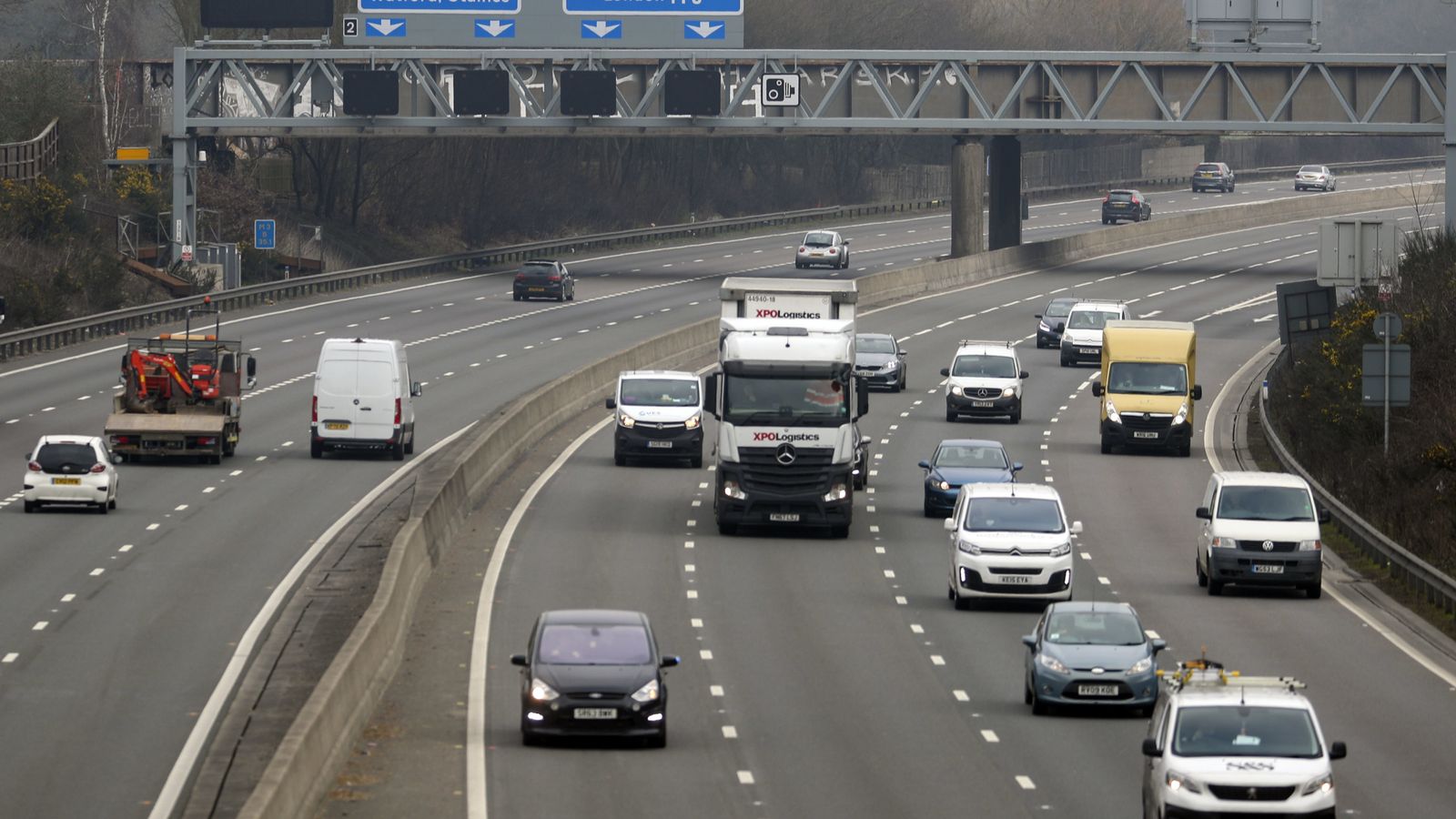New smart motorways to be banned after fatal accidents – find out which ones have been scrapped

The building of new smart motorways is being cancelled following concerns over safety and costs.
Fourteen planned smart motorways – including 11 that are already paused and three earmarked for construction – will be removed from government road-building plans, Downing Street has confirmed.
Existing stretches will remain but be subjected to a safety refit so there are more emergency stopping places.
Read more: What are smart motorways?
About 10% of England’s motorway network is made up of smart motorways. They involve various methods to manage the flow of traffic, including converting the hard shoulder into a live lane.
They were introduced in England in 2014 to ease congestion – and there are 375 miles of smart motorway, including 235 miles with no hard shoulder.
But there have been longstanding fears following fatal accidents involving vehicles forced to stop in live lanes, without a hard shoulder, only to be hit from behind.
11 already paused:
M3 Junction 9 to 14
M40/M42 interchange
M62 Junction 20 to 25
M25 Junction 10 to 16
Dynamic hard shoulder to all lane running conversions:
M1 Junction 10 to 13
M4 – M5 interchange (M4 Junction 19 to 20 and M5 Junction 15 to 17)
M6 Junction 4 to 5
M6 Junction 5 to 8
M6 Junction 8 to 10a
M42 Junction 3a to 7
M62 Junction 25 to 30
3 earmarked for construction:
M1 North Leicestershire
M1 Junction 35A to 39 – Sheffield to Wakefield
M6 Junction 19 to 21A – Knutsford to Croft
Earlier this month, an inquest heard a crash on a smart motorway that killed two pensioners would not have happened if there had been a hard shoulder.
Derek Jacobs, 83, died when his van was hit by a car on the M1 near Sheffield in 2019.
Advertisement
He had stopped in the live inside lane after a blown tyre, and had remained stationary there for three minutes and 34 seconds before his vehicle was hit by a red Ford KA, driven by Jean Scripps. Her husband died in hospital two months after the collision.
The road to scrapping smart motorways
Plans for up to hundreds of miles of smart motorways were first announced in 2019, with the government aiming to roll out 400 miles across England by 2025.
But two years later, the proposals had been shelved.
At the time, ministers said the policy was “paused” until five years of safety data for schemes introduced before 2020 had been collected. But in his Tory leadership campaign last summer, Rishi Sunak vowed to ban them entirely.
Campaigners have long called for them to be scrapped.
Please use Chrome browser for a more accessible video player
1:50
January 2022: Smart motorway rollout suspended
Jason Mercer died in 2019 while driving to work. He had a shunt with a van on a stretch of the M1 near Sheffield that had been converted to a smart motorway.
After both vehicles stopped, they were hit by a lorry. Claire Mercer says her husband would still be alive had there been a hard shoulder.
Ms Mercer founded Smart Motorways Kill and has been campaigning for the abolishment of the motorways entirely.
Rishi Sunak’s campaign promise
“All drivers deserve to have confidence in the roads they use to get around the country,” The Telegraph quoted Mr Sunak as saying.
“That’s why last year I pledged to stop the building of all new smart motorways, and today I’m making good on that promise.
“Many people across the country rely on driving to get to work, to take their children to school and go about their daily lives, and I want them to be able to do so with full confidence that the roads they drive on are safe.”
Click to subscribe to the Sky News Daily wherever you get your podcasts
RAC road safety spokesman Simon Williams said: “This is a watershed announcement and a victory for everyone who has campaigned against these motorways that, by their design, put drivers in more danger should they be unlucky enough to break down on one.
“Our research shows all lane-running smart motorways are deeply unpopular with drivers so we’re pleased the government has finally arrived at the same conclusion. It’s now vitally important that plans are made for making the hundreds of existing miles of these types of motorway as safe as possible.
“The possibility of converting all lane running stretches to the ‘dynamic hard shoulder’ configuration, where the hard shoulder is open and closed depending on the levels of traffic, could be one option the government considers.”